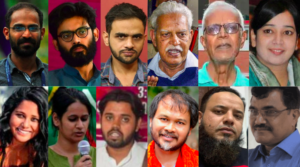 Qazi Mizan: National Investigating Agency (NIA), India’s primary counter-terrorism agency, specifically targets human rights work that reveals abuses and violence on the part of the Indian army and security services. According to LFK’s findings, Tahir Ashraf Bhatti is the head of the Counter Insurgent unit, where he summoned many journalists and harassed them for purely reporting on events in Kashmir.
Qazi Mizan: National Investigating Agency (NIA), India’s primary counter-terrorism agency, specifically targets human rights work that reveals abuses and violence on the part of the Indian army and security services. According to LFK’s findings, Tahir Ashraf Bhatti is the head of the Counter Insurgent unit, where he summoned many journalists and harassed them for purely reporting on events in Kashmir.
India is a party to all four Geneva Conventions and incorporated the Geneva Convention Act of 1960 into its domestic legislation. The act obliges India to implement and respect international humanitarian law, principles and treaties.
UN, along with its dedicated special rapporteurs must continue to highlight and pressure the Indian authorities to reconsider its questionable counter-insurgency measure against protected persons in conflict theatres.
India fears that the advocacy and publication of abuses conducted by the Indian authorities may reach the UN, its special rapporteurs or indeed Europe or the United States.
Thus, a counter dissent strategy has been employed to threaten human rights advocacy work done by Muslims in the region. Journalists and human rights defenders in IIOJK have been subject to unnecessary and disproportional means and methods to prevent their professional work.
Journalists and human rights defenders have been subject to arrest (Asif Sultan, KhurramParvez, Ahsan Untoo, QaziShibli, Irfan Malik, GowharWani, Fahad Shah, Sajad Gul and others), prevented from travelling abroad (Zahid Rafiq, Gowhar Geelani, Khurram Parvez, Shabir Hassan and Sanna Irshad Mattoo), had passports denied (Ahmer Khan, Peerzada Ashiq and more) and been raided (Hilal Mir, AzharQadri, Shah Abbas, Showkat Motta and Parvaiz Bukhari) among other measures including summons to local police stations. Indian government has relied upon ‘colonial’ jurisprudential instruments to legitimize security state measures in the name of maintenance of public order across the Kashmir valley.





